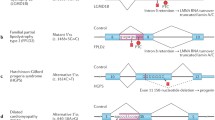Abstract
Defective splicing is a common cause of genetic diseases. On average, 13.4% of all hereditary disease alleles are classified as splicing mutations with most mapping to the critical GT or AG nucleotides within the 5′ and 3′ splice sites. However, splicing mutations are underreported and the fraction of splicing mutations that compose all disease alleles varies greatly across disease gene. For example, there is a great excess (46%; ~threefold) of hereditary disease alleles that map to splice sites in RB1 that cause retinoblastoma. Furthermore, mutations in the exons and deeper intronic position may also affect splicing. We recently developed a high-throughput method that assays reported disease mutations for their ability to disrupt pre-mRNA splicing. Surprisingly, 27% of RB1-coding mutations tested also disrupt splicing. High-throughput in vitro spliceosomal assembly assay reveals heterogeneity in which stage of spliceosomal assembly is affected by splicing mutations. 58% of exonic splicing mutations were primarily blocked at the A complex in transition to the B complex and 33% were blocked at the B complex. Several mutants appear to reduce more than one step in the assembly. As RB1 splicing mutants are enriched in retinoblastoma disease alleles, additional priority should be allocated to this class of allele while interpreting clinical sequencing experiments. Analysis of the spectrum of RB1 variants observed in 60,706 exomes identifies 197 variants that have enough potential to disrupt splicing to warrant further consideration.





Similar content being viewed by others
References
Das R, Reed R (1999) Resolution of the mammalian E complex and the ATP-dependent spliceosomal complexes on native agarose mini-gels. RNA 5:1504–1508
Dommering CJ et al (2012) RB1 mutations and second primary malignancies after hereditary retinoblastoma. Fam Cancer 11:225–233. doi:10.1007/s10689-011-9505-3
Genomes Project C et al (2015) A global reference for human genetic variation. Nature 526:68–74. doi:10.1038/nature15393
Harbour JW (2001) Molecular basis of low-penetrance retinoblastoma. Arch Ophthalmol 119:1699–1704
Ke S et al (2011) Quantitative evaluation of all hexamers as exonic splicing elements. Genome Res 21:1360–1374. doi:10.1101/gr.119628.110
Kimura M (1983) The neutral theory of molecular evolution. Cambridge University Press, Cambridge
Klutz M, Brockmann D, Lohmann DR (2002) A parent-of-origin effect in two families with retinoblastoma is associated with a distinct splice mutation in the RB1 gene. Am J Hum Genet 71:174–179. doi:10.1086/341284
Konarska MM, Sharp PA (1986) Electrophoretic separation of complexes involved in the splicing of precursors to mRNAs. Cell 46:845–855
Lefevre SH et al (2002) A T to C mutation in the polypyrimidine tract of the exon 9 splicing site of the RB1 gene responsible for low penetrance hereditary retinoblastoma. J Med Genet 39:E21
Lek M et al (2016) Analysis of protein-coding genetic variation in 60,706 humans. Nature 536:285–291. doi:10.1038/nature19057
Lim KH, Fairbrother WG (2012) Spliceman—a computational web server that predicts sequence variations in pre-mRNA splicing. Bioinformatics 28:1031–1032. doi:10.1093/bioinformatics/bts074
Meynert AM, Bicknell LS, Hurles ME, Jackson AP, Taylor MS (2013) Quantifying single nucleotide variant detection sensitivity in exome sequencing. BMC Bioinform 14:195. doi:10.1186/1471-2105-14-195
Padgett RA, Grabowski PJ, Konarska MM, Seiler S, Sharp PA (1986) Splicing of messenger RNA precursors. Annu Rev Biochem 55:1119–1150. doi:10.1146/annurev.bi.55.070186.005351
Papasaikas P, Tejedor JR, Vigevani L, Valcarcel J (2015) Functional splicing network reveals extensive regulatory potential of the core spliceosomal machinery. Mol Cell 57:7–22. doi:10.1016/j.molcel.2014.10.030
Roscigno RF, Garcia-Blanco MA (1995) SR proteins escort the U4/U6.U5 tri-snRNP to the spliceosome. RNA 1:692–706
Scheffer H, Van Der Vlies P, Burton M, Verlind E, Moll AC, Imhof SM, Buys CH (2000) Two novel germline mutations of the retinoblastoma gene (RB1) that show incomplete penetrance, one splice site and one missense. J Med Genet 37:E6
Schubert EL, Strong LC, Hansen MF (1997) A splicing mutation in RB1 in low penetrance retinoblastoma. Hum Genet 100:557–563
Soemedi R et al (2017) Pathogenic variants that alter protein code often disrupt splicing. Nat Genet. doi:10.1038/ng.3837
Stenson PD et al (2003) Human gene mutation database (HGMD): 2003 update. Hum Mutat 21:577–581. doi:10.1002/humu.10212
Taggart AJ, DeSimone AM, Shih JS, Filloux ME, Fairbrother WG (2012) Large-scale mapping of branchpoints in human pre-mRNA transcripts in vivo. Nat Struct Mol Biol 19:719–721. doi:10.1038/nsmb.2327
Xiong HY et al (2015) RNA splicing. The human splicing code reveals new insights into the genetic determinants of disease. Science 347:1254806. doi:10.1126/science.1254806
Yeo G, Burge CB (2004) Maximum entropy modeling of short sequence motifs with applications to RNA splicing signals. J Comput Biology 11:377–394. doi:10.1089/1066527041410418
Acknowledgements
R.S. was supported by Postdoctoral Fellowship from Center for Computational Molecular Biology (CCMB), Brown University. C.L.R. was supported by Graduate Research Fellowship from National Science Foundation (NSF). This work was supported by the National Institutes of Health (NIH) Grants R01GM095612 (to W.G.F.), R01GM105681 (to W.G.F.) and R21HG007905 (to W.G.F.) and by SFARI award 342705 (to W.G.F.).
Author information
Authors and Affiliations
Corresponding author
Ethics declarations
Conflict of interest
The authors declare that they have no conflict of interest.
Additional information
Kamil J. Cygan and Rachel Soemedi contributed equally to this work.
Electronic supplementary material
Below is the link to the electronic supplementary material.
Rights and permissions
About this article
Cite this article
Cygan, K.J., Soemedi, R., Rhine, C.L. et al. Defective splicing of the RB1 transcript is the dominant cause of retinoblastomas. Hum Genet 136, 1303–1312 (2017). https://doi.org/10.1007/s00439-017-1833-4
Received:
Accepted:
Published:
Issue Date:
DOI: https://doi.org/10.1007/s00439-017-1833-4




